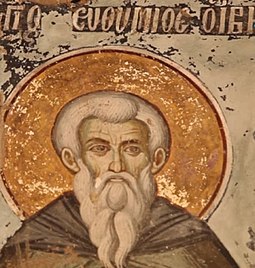Euthymius the Athonite
- Machine translation, like DeepL or Google Translate, is a useful starting point for translations, but translators must revise errors as necessary and confirm that the translation is accurate, rather than simply copy-pasting machine-translated text into the English Wikipedia.
- Do not translate text that appears unreliable or low-quality. If possible, verify the text with references provided in the foreign-language article.
- You must provide copyright attribution in the edit summary accompanying your translation by providing an interlanguage link to the source of your translation. A model attribution edit summary is
Content in this edit is translated from the existing Georgian Wikipedia article at [[:ka:ექვთიმე მთაწმიდელი]]; see its history for attribution. - You may also add the template
{{Translated|ka|ექვთიმე მთაწმიდელი}}to the talk page. - For more guidance, see Wikipedia:Translation.
Saint Euthymius of Athos | |
|---|---|
 A fresco of Euthymius from the Protaton Church at Karyes, Mount Athos | |
| Athonite Father | |
| Born | c. 955 Meskheti, Kingdom of the Iberians |
| Died | c. 1024 |
| Venerated in | Eastern Orthodox Church |
| Feast | May 13 |
| Patronage | Georgia Mount Athos |
Euthymius the Athonite (Georgian: ექვთიმე ათონელი Ekvtime Atoneli; c. 955–1024) was a Georgian monk, philosopher and scholar, who is venerated as a saint. His feast day in the Orthodox Church is May 13.[1]
Euthymius was a Georgian, the ethnonym used by the Byzantines as Iberian, that came from the Kingdom of the Iberians.[2] The son of John the Iberian and nephew of the Tornike Eristavi, Euthymius was taken as a political hostage to Constantinople but was later released and became a monk joining the Great Lavra of Athanasios on Mount Athos. He subsequently became the leader of the Georgian Iviron monastery, which had been founded by his father,[3] and emerged as one of the finest Eastern Christian theologians and scholars of his age. Euthymius labored as abbot of the Iviron Monastery on Mt. Athos for fourteen years before stepping aside to concentrate on his translations.[4]
Fluent in Georgian, Greek and other languages, he translated many religious treatises and philosophical works. Among his major works was the translation of sibrdzne balavarisa (Wisdom of Balahvari), which some believe to be a Christianized version of episodes from the life of Gautama Buddha that became very popular in Medieval Europe as the story of Barlaam and Josaphat. Of equal importance was Euthymius’ work to prepare Georgian translations of various Greek philosophical, ecclesiastical and legal discourses.
He died near Byzantium, when a mule on which he was riding, startled by the approach of a beggar made to bolt and Euthymius fell. His relics are buried in the Church of Saint John the Baptist at the Iveron Monastery on Mt. Athos.[4]
References
- ^ (in Greek) Ὁ Ὅσιος Εὐθύμιος ὁ Ἀθωνίτης κτήτορας τῆς Ι.Μ. Ἰβήρων. 13 Μαΐου. ΜΕΓΑΣ ΣΥΝΑΞΑΡΙΣΤΗΣ.
- ^ Elguja Xintʻibiże (1998). Designations of the Georgians and their etymology. Tʻbilisis Universitetis Gamomcʻemloba. p. 73. ISBN 978-5-511-00775-5.
- ^ Kalistrat Salia (1983). History of the Georgian nation. N. Salia. p. 82.
- ^ a b "St. Euthymius of Athos the translator", Orthodox Church in America
Sources
- Theodor Dowling, Sketches of Georgian Church History, Adamant Media Corporation (October 9, 2003), ISBN 1-4212-2891-2













